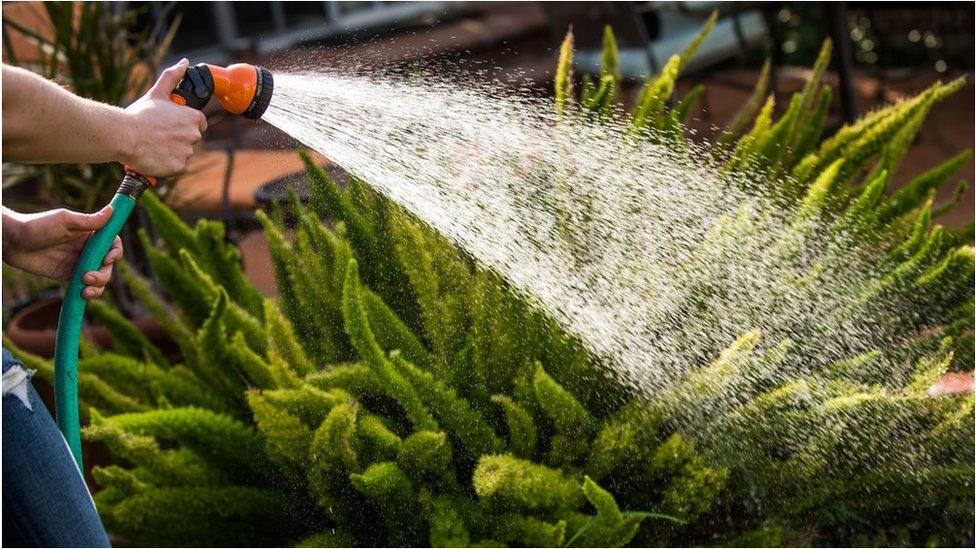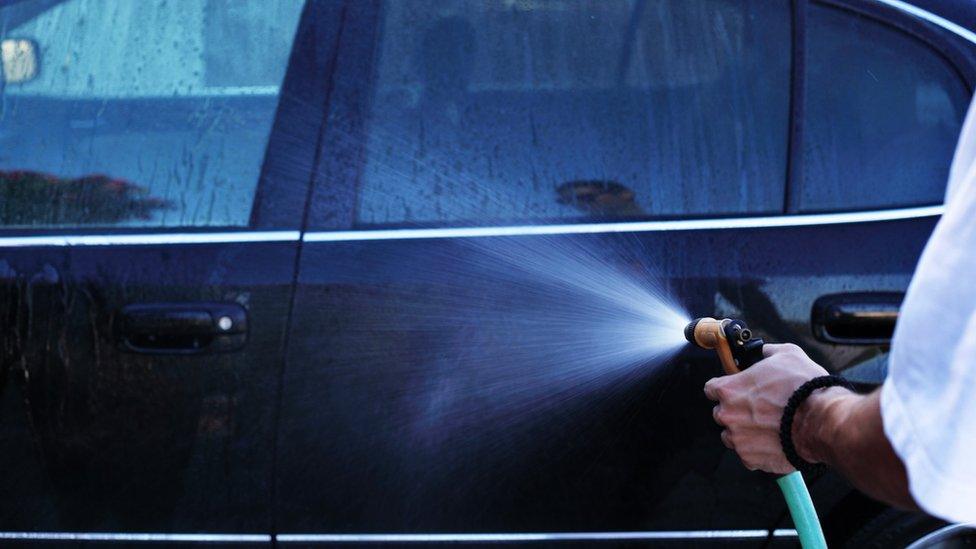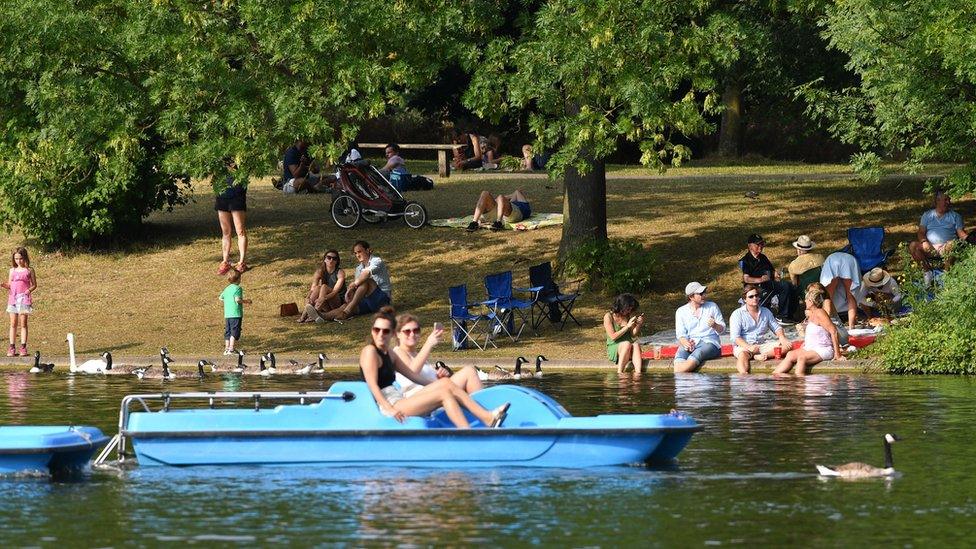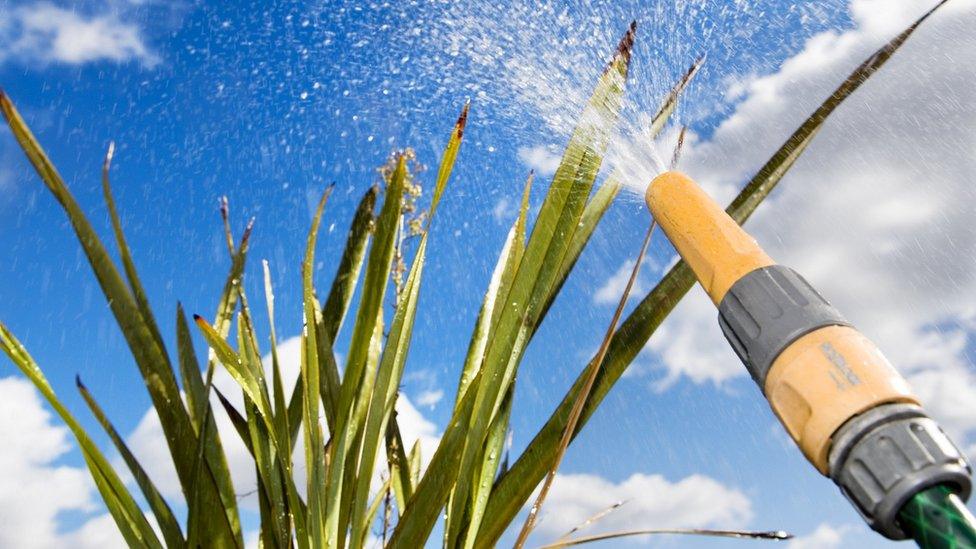Reality Check: Do hosepipe bans work?
- Published

The UK heatwave has led to much talk of whether there will be hosepipe bans, although so far only Northern Ireland Water has introduced one.
But do they work? The answer is that they probably do, although the reductions in water demand tend not to be huge.
There's been some research into the effectiveness of hosepipe bans, particularly looking at the widespread bans in 2006 and 2012.
The problem with 2012 was that the restrictions were introduced in early April - but almost immediately heavy rain set in, which led to extensive flooding.
The problems with enforcing a ban when there are flood warnings in place, together with the fact that people would be considerably less likely to use hosepipes to water their gardens or fill swimming pools during a period of heavy rain, mean that 2012 was not really a representative example.
Incidentally, the water companies no longer call them hosepipe bans - they were replaced in 2010 by temporary use bans (Tubs), external, which cover almost anything you might consider doing at home with a hosepipe, such as cleaning a patio, washing a car, filling an ornamental fountain and even cleaning a private leisure boat.
The idea of a hosepipe ban is to reduce the level of water consumption to winter levels.
Joint research by the universities of Manchester, Edinburgh, Southampton and Lancaster, external in 2014 suggested that fewer than 20% of people with gardens ever used a hosepipe to water it.
The Energy Saving Trust estimates that of the average 142 litres (284 pints) of water used per person per day, only about 1% goes on the garden and 1% on the car, external.
On the other hand, running a hosepipe for an hour uses about 1,000 litres of water, so it doesn't take many people watering the garden every day with a hose to add up to a considerable amount of water.

A report by UK Water Industry Research, external found an 18% fall in consumption in 2012, although that did not take into account the impact of the weather.
As mentioned, you would expect people to use less water, especially outdoors, if it's raining.
A report prepared for the Environment Agency, external did take account of the wet weather when it looked at the impact of the restrictions.
It found that in 2012 there was not a statistically significant reduction in water usage after the introduction of the Tub.
But it also looked at 2006 when, it found, there had been a fall of about 10% in usage, which was statistically significant, although it was not possible to demonstrate conclusively that this was due to the restrictions.
Rob Lawson, from Artesia Consulting, told BBC Reality Check that water consumption in a dry summer typically increased by about 10%-25% compared with winter but this could be as high as 40%-50% in specific areas for short periods during heatwaves such as the one we are experiencing at the moment.
A hosepipe ban is not the first measure taken by water companies - their first step is to call for restraint in the use of water.
Severn Trent, United Utilities and Southern Water are currently encouraging their customers to take steps such as taking shorter showers and not using unattended hosepipes.
If a Tub does not save enough water, then further restrictions may be imposed such as non-essential use drought orders, which restrict non-domestic water use, preventing companies and local authorities from using hoses to clean windows, water plants and fill fountains and swimming pools, for example. A drought order would also stop golf courses using mains water to keep their grass green, although it would not prevent them using water from lakes or boreholes on the courses.
Predicting savings
Water companies have to produce drought plans, which outline what steps they would take to deal with water shortages, some of which include estimates for how much water would be saved.
Thames Water's drought plan, external includes estimates of how much water each step it takes will save. It predicts the biggest savings (between 7% and 10% in summer) will come from a media campaign together with a ban on unattended hoses and sprinklers, which could be imposed before a Tub, although other water companies consider it as part of a Tub. A full hosepipe ban would then save another 3%-4%, the company predicts.
United Utilities' drought plan, external says: "The savings associated with a campaign for voluntary water use restraint has been estimated to be 3%-5% of the average dry weather demand expected during the drought period. This is based on the experience of hosepipe bans introduced by us in 1995-96 and 2010."
Anglian Water estimates, external the savings from just hosepipe restrictions at between 5% and 7%.
Southern Water says, external that a ban on unattended hosepipes and sprinklers would reduce demand by about 2.5% while a full hosepipe ban would save another 5%.



- Published2 July 2018

- Published30 June 2018
